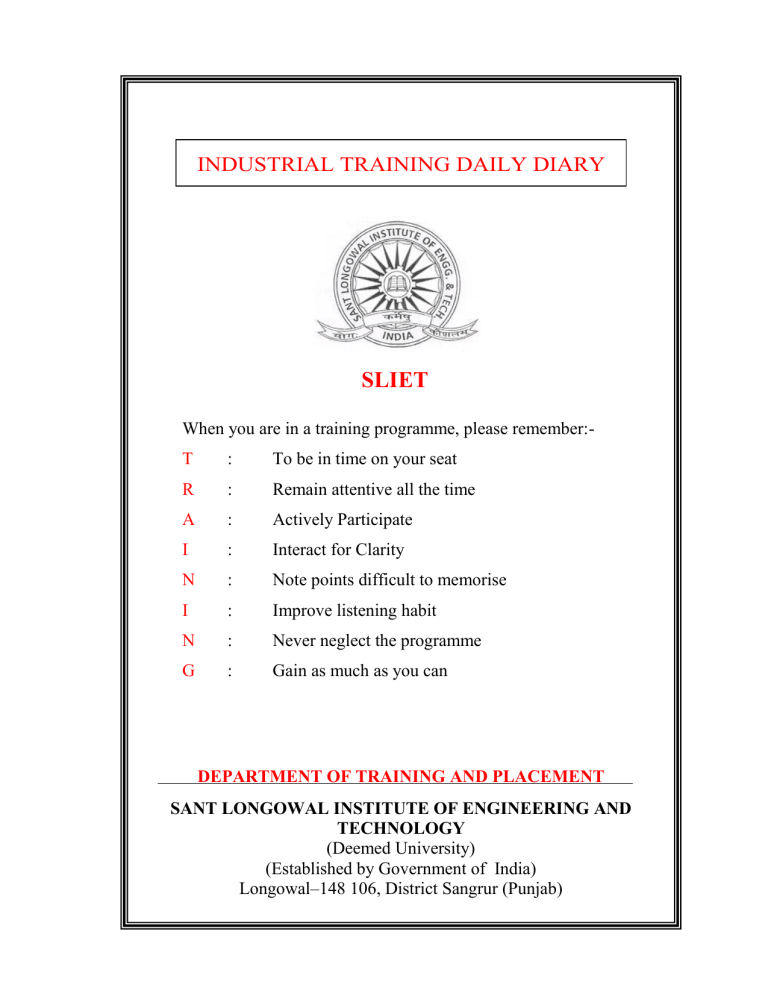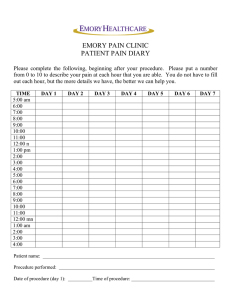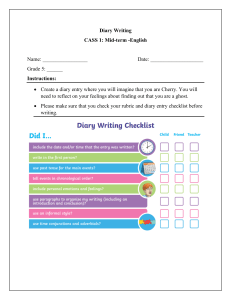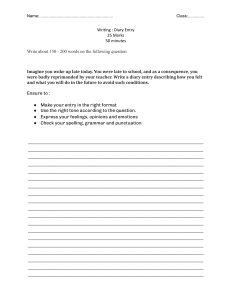
INDUSTRIAL TRAINING DAILY DIARY SLIET When you are in a training programme, please remember:T : To be in time on your seat R : Remain attentive all the time A : Actively Participate I : Interact for Clarity N : Note points difficult to memorise I : Improve listening habit N : Never neglect the programme G : Gain as much as you can DEPARTMENT OF TRAINING AND PLACEMENT SANT LONGOWAL INSTITUTE OF ENGINEERING AND TECHNOLOGY (Deemed University) (Established by Government of India) Longowal–148 106, District Sangrur (Punjab) Industrial Training Daily Diary SANT LONGOWAL INSTITUTE OF ENGINEERING AND TECHNOLOGY (Deemed University & ESTABLISHED BY GOVT. OF INDIA) LONGOWAL – 148 106, DISTRICT SANGRUR (PB.) Photograph duly attested by Co-ord. (T&P) Name of student : ________________________________________ Father’s Name & Address : ________________________________________ ________________________________________ ________________________________________ Tel. No. _________________________________ Regn. No. : ________________________________________ Branch :_________________________________________ Period of training : From ________________ To________________ Name of organization/industry : ________________________________________ With address : ________________________________________ Name & designation of Officer-in-charge : ________________________________________ : ________________________________________ : Phone No. ______________(O)___________(R) Name of Co-ord. (T&P) : _______________________________________ i CONTENTS S.No. Particulars Page Nos./Annexures 1. Guidelines for industrial training 1-8 2. Daily Report Writing Sheets 09-20 3. Graph Papers 21-24 4. Report on Shop/Section/Department Writing Sheet 25-32 5. Format of Industrial Training Report Annexure ‘A’ 6. Attendance Sheet Annexure ‘B’ 7. Training Evaluation Report Annexure ‘C’ Instructions For Writing Daily Diary Report of Shop/Section/Department Write the daily diary/report carefully and legibly. For Report on deptt./section/shop additional sheets may be used, if more space is required. For diagrams, illustrations and sketches use graph sheets. Get the daily diary signed by the officer-in-charge of section/deptt./shop after every two weeks. Also get the report on shop/deptt./section signed by him. Those who are taking training at far away places and department is monitoring their training should send the Photostat copy of the ‘Daily Report’ after every two weeks to the Training & Placement officer of Institute by name duly signed by officer in charge of training in Industry. Write down a report on the deptt./shop/section whenever you shift to the other section/shop/Deptt. This report shall be useful to you in writing the training report. Wear the uniform (knee length Grey coat) or as prescribed by the industry. For details, go through the guidelines for industrial training issued by the Training and Placement Department, SLIET, Longowal. Get the evaluation done in time by the industry & request them to dispatch the evaluation report to the office of Head, Training and Placement, SLIET, Longowal. Every student has to write a training report individually, which may be neatly typed and is to be submitted in the concerned department at SLIET, Longowal along with the attendance record after the completion of the training. ii GUIDELINES FOR INDUSTRIAL TRAINING 1. ABOUT THE INSTITUTE (SLIET, LONGOWAL) Sant Longowal Institute of Engineering & Technology (SLIET) was established by Ministry of Human Resource and Development, Government of India in 1989 adjacent to the Longowal village, district Sangrur, Punjab on the new concept of flexible, modular and multi-point entry system. The aim was to impart technical education to both rural and urban youth from all over India to provide the quality technical manpower of all levels to the present industry. The institute is running twelve certificate, ten diploma, nine degree and six post-graduate programmes in the emerging and non-conventional areas of engineering. The Masters in Business Administration (M.B.A.) is introduced recently from the academic year 2009. Industrial training of six/eight week’s duration is an integral part of the academic curricula of all the programmes. Objectives of the Institute: Mapping global standards in technical education Continuous improvement in education system for sustaining global competitiveness To promote entrepreneurial skills for self employment. To provide extension services to industry, working population, pass out students, social organizations. To promote industry-institute linkage. To develop R & D facilities to fulfill Academic/Industrial requirements. 2. NEED OF INDUSTRIAL TRAINING In the present scenario, manufacturing is approaching to become more flexible, agile and efficient under the changing environment of global competition, increased product variety, high renewal rate of product and shorter product life cycle in technology. New materials and their advanced processing are evolving. Product quality and maintainability are the key issues to be addressed on priority. The pace of development in the manufacturing world, process/IT industries is very fast. In order to cope with manufacturing competitiveness and to take leadership in manufacturing and R & D, the exposure to the new technologies is essential for the young engineering professionals who have to face these challenges and carry the technologies forward. 1 Industrial Training refers to work experience that is relevant to professional development prior to graduation. At SLIET, Longowal Industrial Training of eight to twelve weeks is provided during the semester breaks before the beginning of pre-final year. Industrial Training is an essential component in the development of the practical and professional skills required for an Engineer and an aid to prospective employment. Many employers regard this period as a chance to vet new employees for future employment. Whilst difficult, it is desirable to obtain experience in a range of activities or practices followed in modern industry. It should also be noted that developing an awareness of general workplace behaviour and interpersonal skills are important objectives of the Industrial Training experience. Industrial Training Objectives: To expose engineering students to the industrial environments, which cannot be simulated in the classroom. To apply the engineering knowledge in real industrial situations. To use the experience gained from the ‘Industrial Training’ in discussions held in the lecture rooms. To gain experience in writing reports in engineering works/projects. To expose students to the engineer’s responsibilities and ethics. To expose the students to future employers. Familiarize with various materials, processes, products and their applications along with relevant aspects of quality control and shop floor management. Understand the psychology of the workers and their habits, attitudes and approach to problem solving. Get exposed to the current technological developments relevant to the subject area to which the training pertains. Understand the social, economic and administrative considerations that influence the working environment of industrial organizations. 3. INDUSTRIAL TRAINING REPORTS i) Daily Training Dairy & Departmental Report. ii) Industrial Training Report 3.1 DAILY TRAINING DAIRY The main purpose of writing daily training diary is to cultivate the habit of documenting and to encourage the students to search for details. It develops the students’ own thought process and reasoning abilities. The students should record in the daily training diary the day to day account of the observations, impressions and information gathered. It should contain the sketches & drawings related to the observations made by the students. 2 The daily training diary should be got signed after every two weeks from the supervisor/incharge of the section in which the student has been working (See Annexure-A). The diary should also be produced to the Coordinator (Training & Placement) visiting the industry from time to time and got ratified on the day of his visit. Daily training diary and Industrial Training Report should be submitted by the students alongwith attendance record and evaluation sheet (industrial marks awarded by industry) to the Department of T&P, SLIET, Longowal immediately after the completion of the training. The daily training dairy will be evaluated on the basis of the following criteria: Regularity in maintenance of the diary. Adequacy & quality of information recorded. Drawings, sketches and data recorded. Thought process and recording techniques used. 3.2 DEPARTMENTAL REPORT When the training of the student in a particular department/section/shop of an industry is completed, he should write departmental report in the daily diary. Report should include description of the department/Section/Shop, the processes and procedures followed in it. Individual items of equipment, special attachment, indigenously adopted tools should be described. Personnel & any other human resource features should be highlighted. Drawings, sketches, specification of equipment, used, should be given wherever essential. The report should also contain entire studies & discussions carried out by the students in addition to what he/she has observed during his/her day to day work. The departmental report should be signed by the student and also by his officer-in-charge of that department/section/shop. 3.3 INDUSTRIAL TRAINING REPORT A student should learn about equipment, machines, processes and other industrial practices in industry. After collecting the information, he should prepare a comprehensive training report after completion of his training period to indicate what he has observed and learnt in the the training period. The students may contact his Co-ord. (T&P) /industrial guide(s) for assigning him special topics and problems and prepare the training report on the assigned topics. The last week of the training should be utilized for the purposes of writing this report, originality & method of presentation is very important for writing training report. Daily training diary and departmental reports will also help to a great extent in writing the industrial report since much of 3 the information has already been incorporated by the student into the daily training diary. The training report should be signed by the manager/incharge of the organization and Co-ord.(T&P). The training report will be evaluated on the basis of following criteria. I. Originality II. Very adequate and purposeful write-up. III. Organization, drawings, sketches, format, style, language etc. IV. Variety and relevance of learning experience. V. Practical applications and their co-relation with basic theory and concepts taught in the course. 4. EVALUATION The industrial training of the students will be evaluated in two stages: A) Evaluation by Industry B) Evaluation through seminar presentation/viva-voce at the Institute. 4.1 EVALUATION BY INDUSTRY Industry will evaluate the students based on the Punctuality, Maintenance of Daily Diary and skill test. 4.2 EVALUATION THROUGH SEMINAR PRESENTATION The students will present his report though seminar, which will be held by an expert committee constituted by the concerned department as per norms of the institute. The evaluation through seminar presentation will be based on the following criteria. a) Quality of material presented. b) Proper planning for presentation. c) Effectiveness of presentation. d) Depth of knowledge and skills. e) Attendance record, daily diary, departmental reports shall also be analyzed alongwith the Training Report. f) Seminar presentation will have advantage of sharing knowledge & experience amongst students & teachers and building communication skills and confidence in students. 5. DISCIPLINE, CONDUCT AND GENERAL DIRECTIONS a) The industrial organization where you have been placed for training has been very kind to provide you this facility. If you show sufficient interest and make efforts to learn, you can be 4 sure of help and guidance from them. Every industry has its own organizational system developed over the year. Discipline and punctuality form the bedrock of the organizational system. Do not try to seek concessions from the normal practices. Expected to be followed & do your best to adapt yourself to the system prevailing in the concerned industry. b) You must observe the working hours of the organization where you are placed, for industrial contact and will be entitled during this period only to such holidays as are admissible in the concerned organization. c) Your behaviour under all circumstances should be that of a responsible person and your conduct should be exemplary. d) You should respect the rank and file in the organization and wherever necessary you should learn skills even from the workers. e) You should report punctually to the concerned organization on the specified joining date. f) In case you have any difficulty regarding your training, you may approach the officer incharge of your training program in industry/Coordinator (T&P) of this institute with whom you are attached. But note that it is favour. g) At places where you are asked only to observe things, you should show a high degree of interest and keenness so that you may be invited to do the job with your own hands. If this is not be possible, you should observe the most important and significant things and study them in great details. h) On joining the industry, an indemnity bond may invariably be filled in if required by the organization. i) You should take with yourself relevant reading material in the form of reference and textbooks. j) During industrial training, the safety is your own responsibility as certain the safety rules of industrial concern and follow the same strictly. The institute and the industry shall not be liable for any kind of unfortunate incident. k) Maintain a diary to write daily training report. It should be shown to the supervisor/Coordinator (T&P) on their visit. This daily report will help you to write “Training report” at the end of training period. l) Mark your daily attendance in the prescribed Performa. See Annexure-D. Before, leaving the organization, find out that your Evaluation/Grading report has been sent by the organization in time to the Training & Placement Department of this institute. You may over 5 stay for a day or two, if necessary, to ensure that your evaluation report has been dispatched to your Coordinator. “Training Evaluation Report” is attached at Annexure-C. It should be handed over to your Coordinator (T&P), in case the same has not been dispatched by the organization. Make you own arrangements for lodging & boarding during industrial training. m) Do not forget to write training report in a systematic manner. It should be comprehensive and cover all the points mentioned in ‘Guidelines for Industrial Training”. The report should be written with the help of your officer-in-charge/Co-ord. cum counselor (T&P) and after thorough discussion with the staff responsible for your training in different shops in the organization. You should be regular in writing your Daily Diary. n) Three copies of industrial training report should be prepared in the usual format. One copy should be submitted to the organization if required, second in the institute to the concerned Head of the Department along with daily training diary, keep the third copy for you. 6. GUIDELINES FOR REPORT PREPARATION During industrial training, students should acquaint themselves with the following aspects: 6.1 General information regarding Industry a) Type of organization/industry. b) Organizational structure of the organization/industry. c) Products manufactured/services rendered (give detailed specifications). d) Details of technical manpower employed in the organization. e) A layout diagram of the industry/organization. f) Functions performed by various departments in the organization and their interrelationship. g) Investment pattern, sales turnover and profitability etc. 6.2 Manufacturing/Construction Division. a) Study the plant and equipment b) Study the jobs performed c) Study the processes and machines. d) Study the job cards and work allotments. e) Study the tools, jigs and fixtures. f) Study the materials used, specifications and inspection. g) Study the time and motion standards. h) Study the working drawings and their interpretations. 6.3 Inspection and Quality Control 6 a) Study the Indian and International standards for the products manufactured in the organization. b) Study the quality control methods used in the organization. c) Study the measuring instruments and their use. d) Study the quality control reports. e) Study the rejection rates and suggestions for improvements. f) Study the various machines and instruments and their functions. 6.4 Research & Development Section a) Study the preparation of working drawings. b) Study the prototype development and testing. c) Study the use of computers in drafting and design work. d) Study the product life cycle for different products of the industry. e) Study the linkage of industry with universities and/or national research laboratories. 6.5 Assembly and Testing a) Study the procedure for assembly of equipment/machines. b) Study the procedure for testing of assembled and sub-assembled products for proper functioning, reliability and efficiency. c) Study the assembly and dismantling sequence of components in equipment and machine and identify the components likely to have wear and tear in the normal running. d) Study the test reports and analysis for quality production. e) Study the faults noticed during testing and procedure for their rectification. f) Study the automation in sub-assembly/assembly. 6.6 Stores & Purchase Department a) Study the purchase and material issue procedures followed in stores b) Study the procedure for incoming material inspection, storage and record keeping. d) Study the methods of inventory control and management. e) Suggest improvement in purchase procedures, material inspection, storage and handling and inventory management. f) Study critically a few purchase orders and the legal provision contained in them. g) Study the use of computer in inventory control and other operations in the industry. 6.7 Repair & Maintenance a) Study the preventive maintenance schedule and procedures for maintenance of plant, 7 equipment, machinery and structures. b) Study the break down maintenance taking place in the organization. Try to identify the reasons for these breakdowns. c) Study the procedures to estimate the production loss because of breakdown in plant equipment, and machinery and suggest ways and means to reduce it. d) Study the safety measures undertaken in the organization. e) Study the repair and reconditioning procedures for components and equipments. f) Study the pollution control management techniques in the industry. 6.8 Personal & Administration a) Study the kind of administration style in the organization. b) Study the leadership styles in the organization. c) Study the human relations and motivational aspects in the organization. d) Study procedures governing accountability and responsibility in the organization. e) Study how creativity and innovations are practiced in the organization. f) Study wage and incentive system. 6.9 Additional Information a) Study the management information system. b) Study the packaging & warehousing system. c) Study the sales marketing and after sales services. d) Study the system of liaison and co-ordination with suppliers, vendors, ancillaries, distributes, retailers and customers. e) Study the financial management practices. 6.10 Identification of Industrial Problems. a) Interact with professionals working in various departments to gather information about the problem areas in their departments. b) Study the plant layout, material handling, quality control, productivity and other operations from the point of view of their improvements. IMPORTANT Three copies of the Industrial Training Report should be prepared. One copy each should be submitted with organization and the institute. Keep the third for yourself. Every student should prepare his/her training report individually even if the training work has been carried out in groups. 8 DAILY REPORT DAY & DATE REPORT DAY-1 DATE DAY-2 DATE DAY-3 DATE DAY-4 DATE 9 DAILY REPORT DAY & DATE REPORT DAY-5 DATE DAY-6 DATE DAY-7 DATE DAY-8 DATE 10 DAILY REPORT DAY & DATE REPORT DAY-9 DATE DAY-10 DATE DAY-11 DATE DAY-12 DATE Remarks: Signature of Trainee Signature of Incharge/Supervisor (Industry) 11 DAILY REPORT DAY & DATE REPORT DAY-1 DATE DAY-2 DATE DAY-3 DATE DAY-4 DATE 12 DAILY REPORT DAY & DATE REPORT DAY-5 DATE DAY-6 DATE DAY-7 DATE DAY-8 DATE 13 DAILY REPORT DAY & DATE REPORT DAY-9 DATE DAY-10 DATE DAY-11 DATE DAY-12 DATE Remarks: Signature of Trainee Signature of Incharge/Supervisor (Industry) 14 DAILY REPORT DAY & DATE REPORT DAY-1 DATE DAY-2 DATE DAY-3 DATE DAY-4 DATE 15 DAILY REPORT DAY & DATE REPORT DAY-5 DATE DAY-6 DATE DAY-7 DATE DAY-8 DATE 16 DAILY REPORT DAY & DATE REPORT DAY-9 DATE DAY-10 DATE DAY-11 DATE DAY-12 DATE Remarks: Signature of Trainee Signature of Incharge/Supervisor (Industry) 17 DAILY REPORT DAY & DATE REPORT DAY-1 DATE DAY-2 DATE DAY-3 DATE DAY-4 DATE 18 DAILY REPORT DAY & DATE REPORT DAY-5 DATE DAY-6 DATE DAY-7 DATE DAY-8 DATE 19 DAILY REPORT DAY & DATE REPORT DAY-9 DATE DAY-10 DATE DAY-11 DATE DAY-12 DATE Remarks: Signature of Trainee Signature of Incharge/Supervisor (Industry) 20 21 22 23 24 REPORT ON DEPARTMENT/SHOP/SECTION Period From _________________ to __________________ Name of Shop/Deptt./Section __________________________________________ Name & designation of Officer-in-charge training __________________________________________ REPORT: 25 26 27 28 REPORT ON DEPARTMENT/SHOP/SECTION Period From _________________ to __________________ Name of Shop/Deptt./Section __________________________________________ Name & designation of Officer-in-charge training __________________________________________ REPORT: 29 30 31 32 Annexure-“A” FORMAT OF INDUSTRIAL TRAINING REPORT The following titles must be incorporated in the final industrial training report: Preface/Acknowledgement Certificate with Signatures and Seal of the Industry Person Contents/Index Introduction about the Industry Training Schedule Work Done/Observations Specific Assignment/Project Handled Learning after Training Summary 33 Annexure-“B” DEPARTMENT OF TRAINING & PLACEMENT SANT LONGOWAL INSTITUTE OF ENGINEERING & TECHNOLOGY, LONGOWAL, DISTT. SANGRUR (PUNJAB) (DEEMED-TO-BE-UNIVERSITY) TRAINING EVALUATION REPORT (For Certificate & Diploma Students) Period of Training : From _____________To___________ Class (With Discipline) ______________________________ Name & Address of Organization _____________________________ _____________________________ _____________________________ Sr. No. Name of Student Roll No. Punctuality (a) 45 Marks Marks to be awarded by Industry/Organisation Maintenance of Skill Test Daily Diary (b) (c) 45 marks 60 marks Total Marks (a+b+c) 150 Marks REMARKS (if any): SIGNATURE OF TRAINING OFFICER OF INDUSTRY WITH NAME OF INDUSTRY & SEAL Note: Kindly send the training Evaluation Report immediately after completion of the training to the Head, Department of T & P, Sant Longowal Institute of Engineering & Technology, Longowal, Distt. Sangrur (Punjab) to enable the Institute to declare the result in time, preferably through registered post. 34 Annexure-“B” DEPARTMENT OF TRAINING & PLACEMENT SANT LONGOWAL INSTITUTE OF ENGINEERING & TECHNOLOGY, LONGOWAL, DISTT. SANGRUR (PUNJAB) (DEEMED-TO-BE-UNIVERSITY) TRAINING EVALUATION REPORT Name & Address of Organization _____________________________ _____________________________ _____________________________ Sr. No. Name of Student (For B.E. & MBA Programmes) Period of Training: From _____________To_____________ Class (With Discipline) ______________________________ Roll No. Punctuality (a) 30 Marks Marks to be awarded by Industry/Organisation Maintenance of Skill Test Daily Diary (b) (c) 30 marks 40 marks Total Marks (a+b+c) 100 Marks REMARKS (if any): SIGNATURE OF TRAINING OFFICER OF INDUSTRY WITH NAME OF INDUSTRY & SEAL Note: Kindly send the training Evaluation Report immediately after completion of the training to the Head, Department of T & P, Sant Longowal Institute of Engineering & Technology, Longowal, Distt. Sangrur (Punjab) to enable the Institute to declare the result in time, preferably through registered post. 35 Annexure-“C” SANT LONGOWAL INSTITUTE OF ENGINEERING & TECHNOLOGY,LONGOWAL, DISTT. SANGRUR (PUNJAB) (DEEMED-TO-BE-UNIVERSITY) DEPARTMENT OF TRAINING & PLACEMENT ATTENDANCE SHEET Name of Student :___________________ Regn. No :___________________ Date of Commencement of Trg.: ___________________ Date of Completion of Training: ___________________ Name & Address of Organisation/Industry _________________ ___________________________________________________ Name of Course :___________________________________ Period of Training : From___________ To ________________ Initials of the student Sr. No Month & Year Note : 1. 2. 3. 1 2 3 4 5 6 7 8 9 10 11 12 13 14 15 16 17 18 19 20 21 22 23 24 25 26 27 28 29 30 31 Remarks Remarks by by Coordinator Industry (T & P) Attendance Sheet should remain affixed in Daily Training Diary. Do Not remove or tear it off. Student should sign./initial in the attendance column. Do not mark ‘P’ Holidays should be marked in Red Ink in attendance column. Absent should be marked as ‘A’ in Red Ink. Signature of Co-ord cum counsellor (T&P) (Name____________________) Signature of Training Manager With Designation & Seal 36 37



